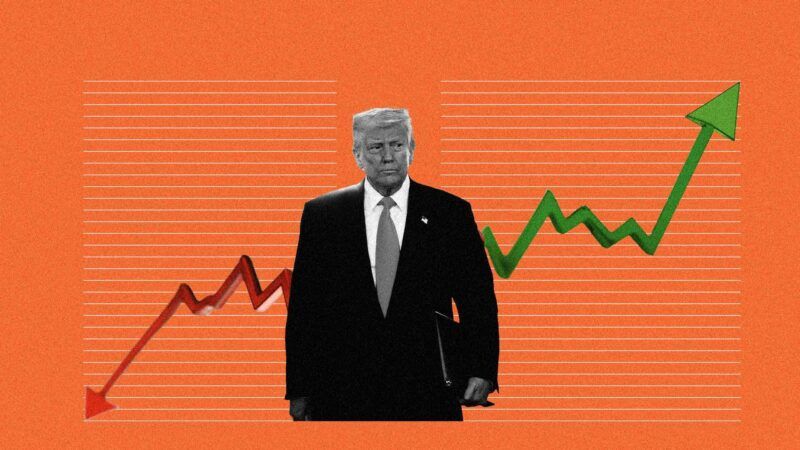Markets Rally as Trump Pauses Tariffs. Should Presidents Have This Much Power?
In the span of a week, Trump cratered the stock market and brought it much of the way back, with little more than public statements.

Last week, President Donald Trump imposed double-digit tariffs on imports from nearly every nation on the planet. The move spooked investors, and the markets plummeted in response. Then this week, Trump announced a 90-day pause on most of the tariffs, at which point the market immediately rallied.
As both Wall Street and Main Street struggle to follow what's going on at any given moment, it's a perfect time to ask whether a president should have this much power over the global marketplace.
On April 2, Trump announced that nearly all imports would soon be subject to tariffs between 10 percent and 49 percent. In response, the stock market saw the largest two-day decline in history, shedding $6.6 trillion in value. At the same time, the value of the American dollar also tumbled, while U.S. Treasury bond yields spiked, a sign of higher interest rates to come.
At the opening bell on April 9, the S&P 500 index was down 18.9 percent—just shy of a bear market.
Later that day, Trump announced "a 90 day PAUSE, and a substantially lowered Reciprocal Tariff during this period, of 10%." The only exception was China, which would be hit with a tariff of 125 percent "effective immediately." Markets immediately rallied: The S&P rose nearly 8 percent within the next hour and ended the day up 9.5 percent.
"It took great courage—great courage—for him to stay the course until this moment," Treasury Secretary Scott Bessent told reporters after Trump announced the pause, adding, "This was his strategy all along." (Just yesterday, White House press secretary Karoline Leavitt said Trump was "not considering an extension or a delay" of tariffs.)
The Founders clearly never envisioned such unfettered power in one person's hands: Article I, Section 8 of the Constitution gives "Power To lay and collect Taxes, Duties, Imposts and Excises" to Congress, not the president.
But over the course of the 20th century, Congress delegated many of its powers to the president, including the power to impose tariffs: Under the 1977 International Emergency Economic Powers Act (IEEPA), the president can unilaterally impose tariffs on other countries "to deal with any unusual and extraordinary threat…to the national security, foreign policy, or economy of the United States, if the President declares a national emergency with respect to such threat."
When Trump issued tariffs on nearly every country in the world, he did so under the authorities granted by the IEEPA. "Underlying [economic] conditions…as indicated by large and persistent annual U.S. goods trade deficits, constitute an unusual and extraordinary threat to the national security and economy of the United States," per Trump's order. "I hereby declare a national emergency with respect to this threat."
Of course, the trade deficit is not a threat: It merely indicates that we buy more products from other countries than they buy from us. It is also not new: According to the U.S. Census Bureau, the U.S. has run a trade deficit each year, totaling hundreds of millions of dollars per year, for decades.
Besides, the U.S. has long been a service-based economy. "Today, four out of five American workers in the private sector are employed in the service economy," according to a 2022 report by the Brookings Institution. In February 2025 alone, according to the U.S. Bureau of Economic Analysis, the U.S. ran a goods deficit of $147 billion but a services surplus of $24.3 billion.
But more to the point, even if there were any merit whatsoever to Trump's argument—that all countries engaged in trade must somehow buy products from each other totaling the exact same value or else somebody is getting "ripped off"—it should not be this easy for the president to simply impose his will upon the market.
In the most uncharitable scenario, a president could impose tariffs and then "pause" them later, while in the meantime, either he or members of his inner circle could buy stock while it was temporarily devalued—a sort of reverse "pump and dump" scheme. In fact, just hours before announcing the pause, Trump said in a post on Truth Social, "THIS IS A GREAT TIME TO BUY!!!"
Markets crave stability. It should not be so simple for a single elected official to cause double-digit swings in the market simply with an announcement. By the same token, it should not be so simple for a president to make policy—a job specifically delegated to Congress—all on his own.


Show Comments (172)